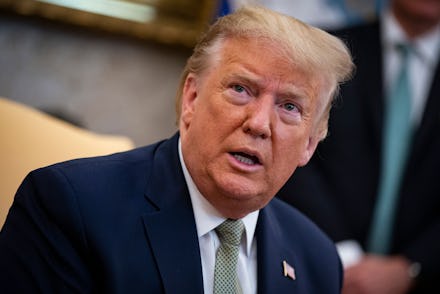Coronavirus won't stop the Trump administration from kicking people off food stamps

As concerns over coronavirus rise, people are advised to stock up enough food for a few weeks indoors. That may not be an option for many, though. Despite the ongoing pandemic, the Trump administration will kick thousands of people off food stamps — at least — with new work requirements going into effect on April 1.
The Trump administration has long planned to tighten work requirements for the Supplemental Nutrition Assistance Program (SNAP, also known as food stamps). Earlier this week, Agriculture Secretary Sonny Perdue told the House Appropriations Subcommittee that the changes would go ahead as planned.
The White House estimates that about 700,000 people will lose their benefits, but that's a conservative guess. The Urban Institute, a nonprofit focusing on economic and social policy research, found that 3.7 million people and over 2 million households will lose their benefits. Those who maintain their benefits will still see extreme reductions. According to the report, about 2.2 million households' average monthly benefits will drop by $127.
Cutting benefits was already widely criticized, with some seeing it as a "deliberate attack." But with more and more states declaring states of emergency over the coronavirus outbreak, the decision to move ahead as scheduled is sparking newfound outrage.
"Really, it's a cruel rule, taking food out of the mouths of hungry individuals," Rep. Barbara Lee (D-Calif.) told Perdue during the hearing. "Why can't we just postpone or delay this at least until at least this critical moment is over?"
Perdue's defense centers around "good cause" waivers that can offer exemptions for work requirements. According to BuzzFeed News, these waivers are applied at the state level, and revolve around whether you have a good cause for missing work. Like, say, your office building shuts down because of a quarantine.
However, those waivers work on a case-by-case basis, and that's not enough during a pandemic. Besides, what does that mean for workers whose jobs may not shut down, like the gig workers still delivering your no-contact food orders, but are still seeing less work and fewer hours. Or what about those who want to self-quarantine?
The Trump administration's approach to the coronavirus so far has left a lot to be desired. The decision to cut SNAP benefits looks like another case of the administration sticking their head in the sand. And for those whose benefits remain, there is still the question of how you can stock food as advised if your benefits are about to be significantly reduced.
It is possible for the government to provide additional assistance. Congress has reviewed the option to authorize Pandemic-SNAP, which provides extra funds to families with children who are eligible for free and reduced school lunches. However, P-SNAP was authorized in 2009 during H1N1 and never actually operated. But if the administration can pour $1.5 trillion into Wall Street, you'd think it could afford to make sure that people are fed.